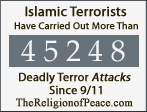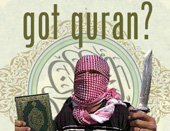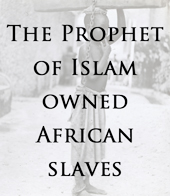TheReligionofPeace
|
|
TROP is a non-political, fact-based site which examines
the ideological threat that Islam poses to human dignity and freedom
|
|
|
Jihad Report
Apr 13, 2024 -
Apr 19, 2024
|
| Attacks |
26
|
| Killed |
101
|
| Injured |
54
|
| Suicide Blasts |
1
|
| Countries |
11
|
|

|
Jihad Report
March, 2024
|
| Attacks |
157
|
| Killed |
771
|
| Injured |
688
|
| Suicide Blasts |
7
|
| Countries |
22
|
|
List of Attacks
|
|
|
It's much easier to act as if critics of Islam have a problem with Muslims as people than
it is to accept the uncomfortable truth that Islam is different
|
|
|
|

|

|
|
|

What can we learn about
Islam from this woman?
|
|
|
|





